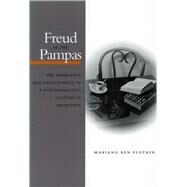Freud in the Pampas
, by Plotkin, Mariano Ben- ISBN: 9780804740609 | 0804740607
- Cover: Paperback
- Copyright: 2/1/2001
This is a fascinating history of how psychoanalysis became an essential element of contemporary Argentine culturein the media, in politics, and in daily private lives. The book reveals the unique conditions and complex historical process that made possible the diffusion, acceptance, and popularization of psychoanalysis in Argentina, which has the highest number of psychoanalysts per capita in the world. It shows why the intellectual trajectory of the psychoanalytic movement was different in Argentina than in either the United States or Europe and how Argentine culture both fostered and was shaped by its influence. The book starts with a description of the Argentine medical and intellectual establishments' reception of psychoanalysis, and the subsequent founding of the Argentine Psychoanalytic Association in 1942. It then broadens to describe the emergence of a "psy culture" in the 1960s, tracing its origins to a complex combination of social, economic, political, and cultural factors. The author then analyzes the role of "diffusers" of psychoanalysis in Argentinaboth those who were part of the psychoanalytic establishment and those who were not. The book goes on to discuss specific areas of reception and diffusion of psychoanalytic thought: its acceptance by progressive sectors of the psychiatric profession; the impact of the psychoanalytically oriented program in psychology at the University of Buenos Aires; and the incorporation of psychoanalysis into the theoretical artillery of the influential left of the 1960s and 1970s. Finally, the author analyzes the effects of the military dictatorship, established in 1976, on the "psy" universe, showing how it was possible to practice psychoanalysis in a highly authoritarian political context.







